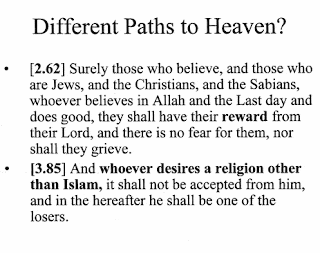- Dec 5, 2010
- 95,276
- 32,319
- 2,290
These are explanatory notes on Major Hasan's seminar on 'The Koranic World View As It Relates to Muslims in the U.S. Military.' An earlier post surveyed some features of the seminar. These notes, put together while Pentagon and Senate investigations into the Fort Hoot shootings are still underway, go through the Major Hasan's slides more systematically.

Click
Major Nidal Hassan said:In this key slide, Major Hasan explains the significance of fatwas for the involvement of Muslims in the US military. He points out that fatwas can reflect conflicting opinions, and there is no single central authority to resolve these conflicts. Individual Muslims must make up their own minds which opinion to follow. He also observes that in relation to the issue of the position of Muslims in the US military, US-based clerics give ambiguous and vague rulings. This may be regarded as a sign that they are under duress. The implication is that their rulings carry less weight. However non-American scholars have issued clear statements rejecting the involvement of Muslims in the US military, on the grounds that this would mean engagement against 'fellow Muslims'.
Major Hasan uses the example of Abraham's readiness to sacrifice his son Ishmael (as the Islamic tradition goes) as a model of what complete submission to Allah looks like. Allah will honor those who submit to him completely

Major Hasan reiterates that Islam is all about total submission to the will of Allah. The choice is stark, between heaven and hell, and wonderful rewards or horrible threats are attached to these choices. The devout and committed Muslim believer is under a powerful motivation to obey the Koran. Whilst individual Muslims may be regarded as moderate, Islam itself is not, because Allah's commands cannot be avoided: 'Muslims may be seen as moderate (compromising) but God is not'. There is no such thing as moderate Islam, for no compromise with disbelief is permitted.
Major Hasan acknowledges that some Muslims may love Islam, but prefer to live in a non-Muslim society. They may say: "I love the Koran and being a Muslim, but I don't want to live under Islamic rule." His response is that it is an obligation upon all Muslims to fight to establish an Islamic state, whether they like it or not.
His final conclusion: 'Muslims (sic) Soldiers should not serve in any capacity that renders them at risk to hurting/killing believers unjustly.' He notes however that Muslims have varying views about this, and perhaps also about what constitutes injustice. They will not all have the same trigger points for resorting to violence.
Click

